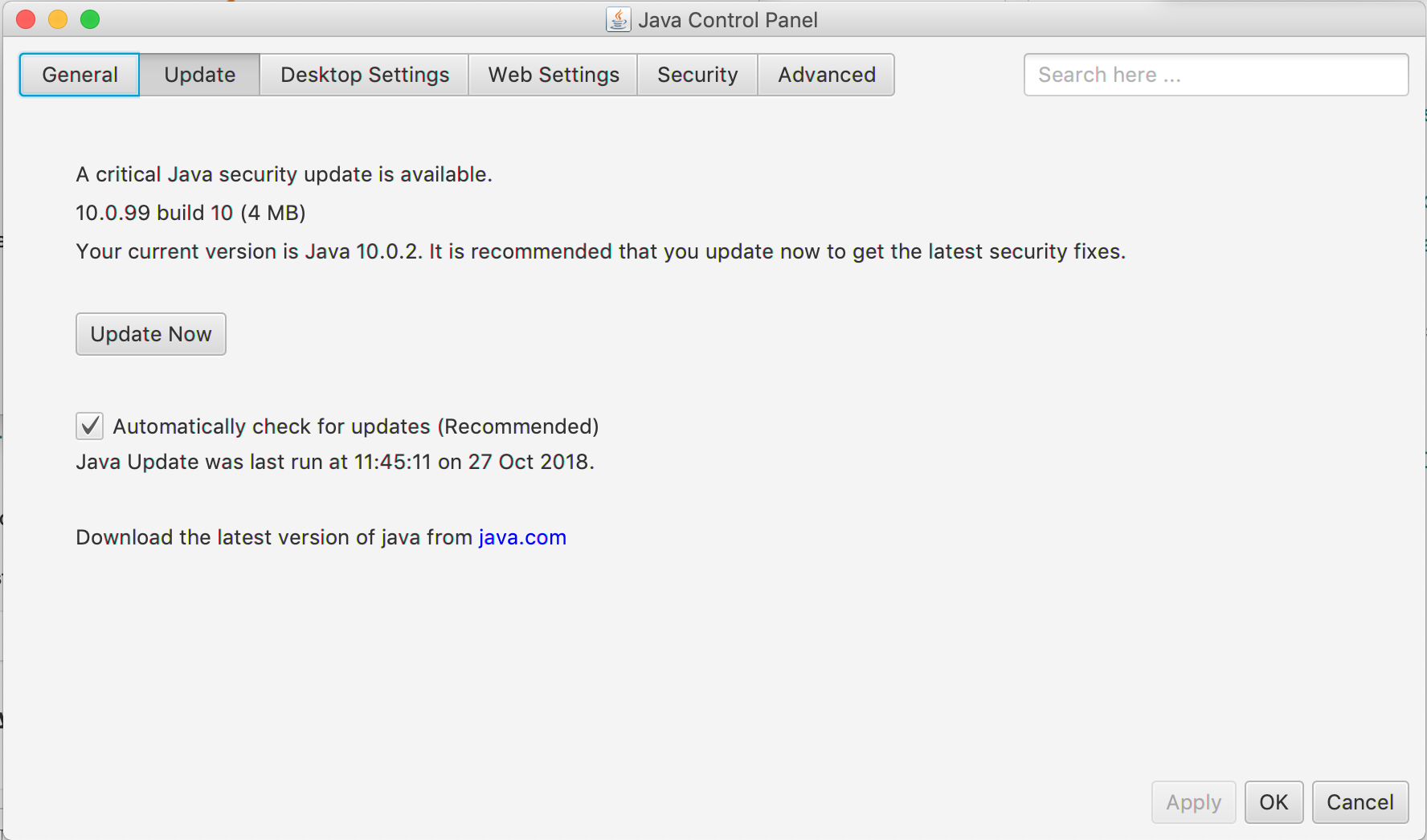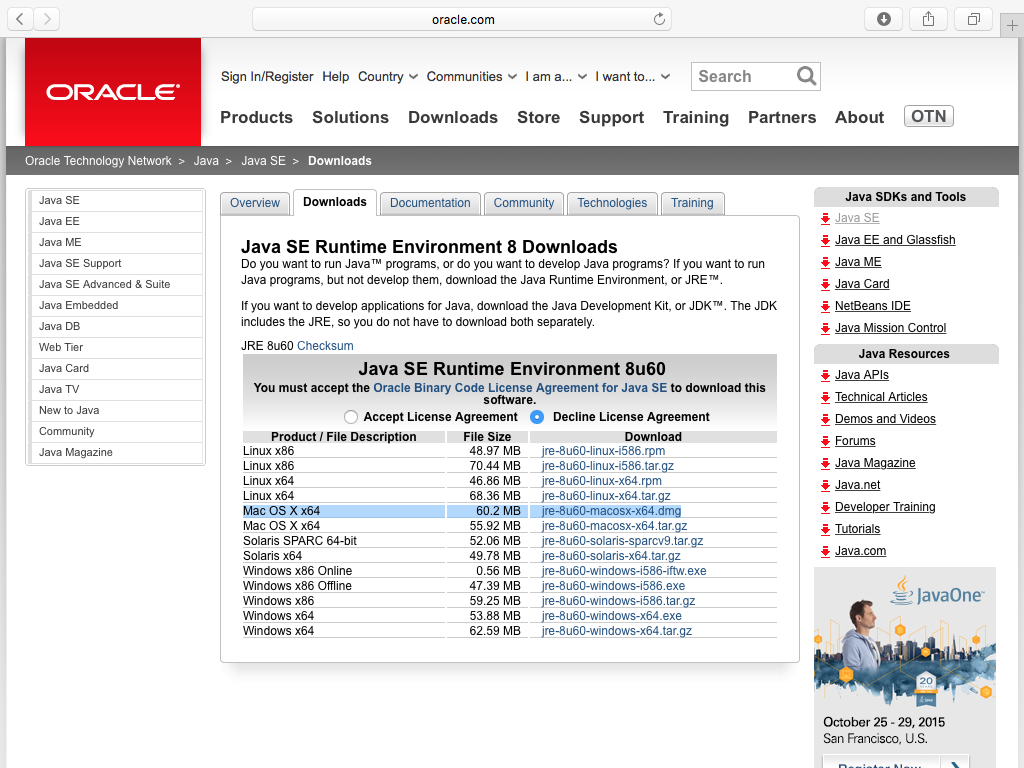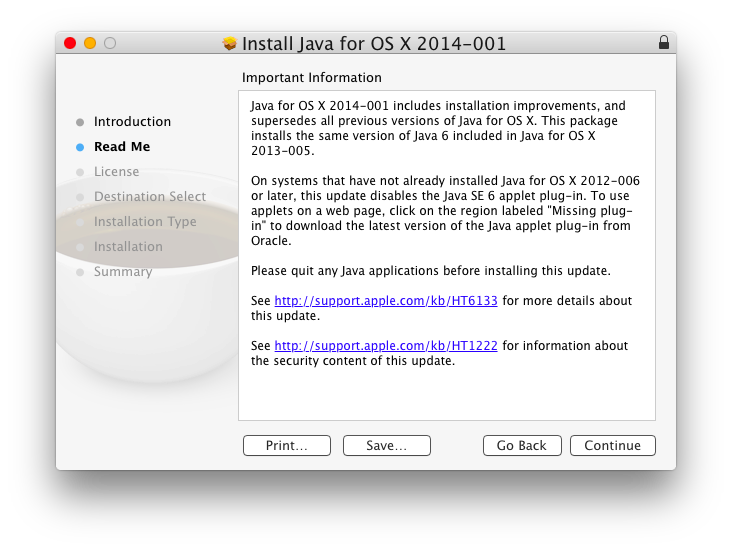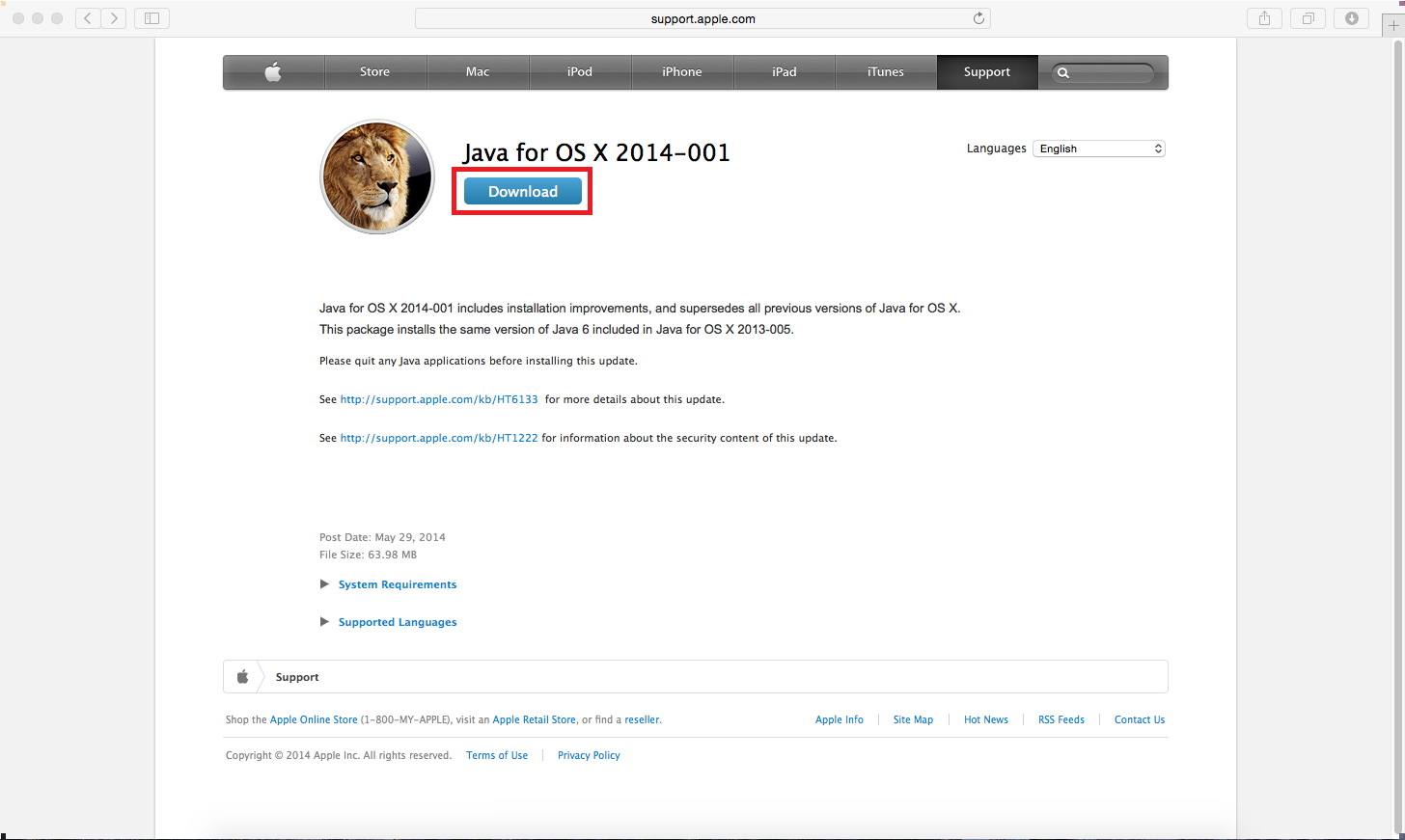Java Mac El Capitan
- Uninstall Java Mac El Capitan
- Java Download For Mac El Capitan
- Java 6 Mac Os El Capitan
- Java Download Mac El Capitan
- Java Para Mac El Capitan
- Java Se 6 Runtime Download For Mac El Capitan
I got it working by adding to /.profile. Somehow after updating to El Capitan beta, it didnt work even though JAVAHOME was defined in.bashprofile. If there are any El Capitan beta users, try adding to.profile. Any idea whether the new Jave update (Version 8 Update 65) is a problem for Adobe CS users running El Capitan? I ran into issues when I installed the new OS but remedied them with some help from your post here and other forums.
Apple has posted notice that Mac OS X 10.11 (El Capitan) will be the last OS X release that supports Java 6, and as such, recommends developers whose applications depend on Java 6 to migrate their apps to a newer Java version provided by Oracle. » More info (apple.com).
Information and system requirements for installing and using Oracle Java on Mac OS X
This article applies to:- Platform(s): Mac OS X
- Java version(s): 7.0, 8.0
» Download latest Java
» After I updated to Sierra, Yosemite or El Capitan, why am I told to install Java after I already installed the latest Java?
» Can I restore Apple Java 6 after uninstalling Oracle Java?
» What are the system requirements for Java on my Mac?
» Why can't I find Java 6 for Mac OS X on java.com?
» Can I use Chrome with Oracle Java on my Mac?
» How do I get Java for my Mac?
» How do I know if I have Java installed on my Mac?
» How do I install Java for my Mac?
» How do I find out what version of Java I have on my Mac?
» How do I enable Java on my Mac?
» How do I clear the Java cache on my Mac?
» How do I update Java on my Mac?
» How do I uninstall Java from my Mac?
» I do not have Mac version 10.7.3 (Lion) or higher. How do I get Java for other Mac versions?
» Is it safe to install previous or older versions of Java?
» Why will applets not run after getting Java through Apple Software Update?
» Why is Oracle Java available only for Mac OS X 10.7.3 and above?
» Can I install Java on Mac 10.10 (Yosemite)?
» The installation hangs during an auto-update, what can I do to get the latest Java?
» When I try to use Java from the command line, why doesn't it work?
» How do I get support or provide feedback on Java?
After I updated to macOS Sierra 10.12, El Capitan (OS X 10.11), or Yosemite (OS X 10.10), why am I told to install Java after I already installed the latest Java?
See information about Apple Java messages. Macos get xd for free.
Can I restore Apple Java 6 after uninstalling Oracle Java?
Yes, see the instructions on the Apple website Restore Apple Java 6. If you have JDK 7 or later versions installed on your system and you want to restore Apple Java 6, then those JDK versions need to be uninstalled first. See the instructions to Uninstall JDK.
What are the system requirements for Java on my Mac?
Operating system requirements: For Java 7 and later versions, you will need an Intel-based Mac running Mac OS X version 10.7.3 (Lion) and above. Installing Java on a Mac is performed on a system wide basis, for all users, and administrator privileges are required. Java can not be installed on a per-user basis.Browser requirements:
Uninstall Java Mac El Capitan
 A 64-bit browser (Safari, for example) is required to run Oracle Java on Mac.
A 64-bit browser (Safari, for example) is required to run Oracle Java on Mac. 
Why can't I find Java 6 for Mac OS X on java.com?
For Java versions 6 and below, Apple supplies their own version of Java. For Mac OS X 10.6 and below, use the Software Update feature (available on the Apple menu) to check that you have the most up-to-date version of Java 6 for your Mac. For issues related to Apple Java 6 on Mac, contact Apple Support. Oracle and Java.com only support Java 7 and later, and only on 64 bit systems.
Mac OS X and Apple Java 6 End of Life
Apple has posted notice that Mac OS X 10.11 (El Capitan) will be the last OS X release that supports Java 6, and as such, recommends developers whose applications depend on Java 6 to migrate their apps to a newer Java version provided by Oracle. » More info (apple.com)
Can I use Chrome with Oracle Java on my Mac?
Chrome browser versions 42 and above. Starting with Chrome version 42, Chrome has disabled the standard way in which browsers support plugins. More info
How do I get Java for my Mac?
You can download Java from java.com.
How do I know if I have Java installed on my Mac?
Mac OS X 10.6 and below: Apple's Java comes pre-installed with your Mac OS.
Mac OS X 10.7 (Lion) and above: Java is not pre-installed with Mac OS X versions 10.7 and above. To get the latest Java from Oracle, you will need Mac OS X 10.7.3 and above.
If you have Java 7 or later versions, you will see a Java icon under System Preferences.
Java versions 6 and below are listed in the Java Preferences.app located in the Applications > Utilities folder on your Mac.
How do I install Java for my Mac?
See Mac Java installation instructions.
How do I find out what version of Java I have on my Mac?
Mac OS X 10.7.3 and above: Under System Preferences click on the Java icon to access the Java Control Panel which will list your Java version.
If you do not see a Java icon under System Preferences, Java 7 or later versions is not installed.
How do I enable Java on my Mac?
When you install Oracle Java on your Mac (Lion and above), Java will be enabled by default.
If you are running a Java application in the browser, you will need to also check that Java is enabled in your browser.
Crash bandicoot for mac. For earlier versions of Java, check the Apple Support site.
How do I clear the Java cache on my Mac?
See How to clear the Java cache on Mac.
How do I update Java on my Mac?
See How to update Java on Mac.
How do I uninstall Java from my Mac?
See Mac Java uninstall instructions.
I do not have Mac version 10.7.3 (Lion) or higher. How do I get Java for other Mac versions?
For Java versions 6 and below, Apple supplies their own version of Java. Use the Software Update feature (available on the Apple menu) to check that you have the most up-to-date version of Apple's Java for your Mac.
Users of Lion Mac OS X 10.7.1 and 10.7.2 should upgrade to 10.7.3 or later versions, so you can get the latest Java version from Oracle.
Is it safe to install previous or older versions of Java?
Oracle highly discourages users from using older versions of Java. Installing old and supported versions of Java on your system presents a serious security risk. Upgrading to the latest version of Java ensures that Java applications will run with the most up-to-date security and performance improvements on your system. You can confirm that you have the latest version on the verification page. If installing an older version of Java is absolutely required, you must first uninstall the current version. See the instructions on the Mac uninstall Java FAQ.
Why will applets not run after getting Java through Apple Software Update?
Safari Update For El Capitan
Apple disables the Java plug-in and Webstart applications when the Java update is done using Software Update. Also, if the Java plug-in detects that no applets have been run for an extended period of time it will again disable the Java plug-in.
Why is Oracle Java available only for Mac OS X 10.7.3 and above?
/serato-update-for-mac-mojave/. The Java Runtime depends on the availability of an Application programming interface (API). Some of the API were added in Mac OS X 10.7.3. Apple has no plans to make those API available on older versions of the Mac OS.
Can I install Java on Mac OS X 10.10 (Yosemite)?
Yes. See Mac OS X 10.10 FAQ.
The installation hangs during an auto-update, what can I do to get the latest Java?
During an auto-update, Mac OS X 10.9 (Mavericks) users might see the installation stall. Download the latest Java from the java.com web site.
When I try to use java from the command line, why doesn't it work? I have Oracle's version of the JRE installed.
Update El Capitan To Sierra
Installing a JRE from Oracle does not update java -version symlinks or add java to your path. For this functionality, you must install the full JDK. See Mac command line info.
How do I get support or provide feedback on Java?
Java Update For El Capitan 1
Provide us details on Feedback form for reporting issues or providing feedback for Java.
You might also be interested in:
- How do I install Java for my Mac?
- How do I uninstall Java on my Mac?
- Where is the Java Control Panel on Mac?
- How do I clear Java cache on my Mac?
- How do I Update Java for my Mac?
- How do I disable Java in my web browser?
Since I upgraded my Mac to OS X El Capitan (version 10.11.2) I am having problems with the R-package rJava. From what I understood, eventually, it is not a problem of rJava or R or RStudio in the first place, but newer versions of Mac OS X do not play well with the latest versions of Oracle’s Java (jdk). Furthermore, some new security features in Mac OS X prevent that environment path settings are passed along to applications like RStudio.

Java Download For Mac El Capitan
In what follows, I listed the steps that solved for me the problem that the package rJava could not be loaded from within RStudio under Mac OS X El Capitan (version 10.11.2).
Problem statement
Unfortunately, the package rJava does not just fail to load, but the R GUI for Mac terminates instantly and in RStudio the R-session gets closed. Both effects are pretty annoying! See the screen shot below on how that might look like.
Some research

After searching the web, the details of the problem are still not clear to me. But it appears that OS X has problems recognizing newer versions Oracle’s Java. OS X seams to be looking for a legacy version 6 of Apple’s own build of Java. As shown in the next section one solution seams to be the installation of Apple’s legacy version 6 of Java and a newer version (e.g. 1.8.0_66) of Oracle’s Java at the same time.

The solution
The post available at https://github.com/snowflakedb/dplyr-snowflakedb/wiki/Configuring-R-rJava-RJDBC-on-Mac-OS-X solved my problem with rJava on Mac OS X 10.11.2.
Java 6 Mac Os El Capitan
Java 6
I already had XCode command line tools installed, so I started at section Java 6. I downloaded the legacy Java 6 runtime from https://support.apple.com/kb/DL1572?locale=de_DE and installed the downloaded .dmg file.
Java 8
Java Download Mac El Capitan
Since I had already installed the latest version of Oracle’s jdk from http://www.oracle.com/technetwork/java/javase/downloads/jdk8-downloads-2133151.html, I skipped the step.
The output of java_home on my machine looks as follows
Please note the 1.7 version are really not needed here.
R for OS X
The latest version of R was already running, so I skipped this step. The check with javareconf gave the following result.
rJava
As the version of rJava from CRAN did not work, I took the latest version from rforge and installed that one.
Java Para Mac El Capitan
A quick check whether rJava can be loaded, is done as follows
Java Se 6 Runtime Download For Mac El Capitan
RStudio
Running the above check on the RStudio console still gives the following error
For some reason which might be connected to a new security feature of Mac OS X, the file libjvm.dylib cannot be found. Loading this library explicitly, as was described in http://stackoverflow.com/questions/30738974/rjava-load-error-in-rstudio-r-after-upgrading-to-osx-yosemite, finally solves the problem.